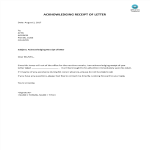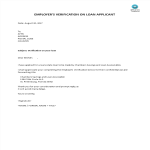Letter of Interest Example

Opslaan, invullen, afdrukken, klaar!
What are some easy steps to writing an interest letter? Are you searching for an example of a Letter of Interest? Download our template now which is ready to go and will help you create a professional Letter of Interest that will wow your future employer.
Beschikbare bestandsformaten:
.docx- Gevalideerd door een professional
- 100% aanpasbaar
- Taal: English
- Digitale download (65.77 kB)
- Na betaling ontvangt u direct de download link
- We raden aan dit bestand op uw computer te downloaden.
brief Belangstellingsbrief Letter of Interest voorbeeld Letter of Interest Voorbeeld sollicitatiebrief voorbeeld vacature hoe schrijf je een brief van interesse stage
What are some easy steps to writing an interest letter? Are you searching for an example of a Letter of Interest? Our template is ready to go and will help you create a professional Letter of Interest that will wow your future employer. Download this sample template now and use it as a guide in writing your Letter of interest!
Letters of interest or cover letters accompany job applications, either in response to a job listing or as an inquiry about unadvertised work opportunities. Their purpose is to bridge the gap between your resume and the specific employer. It is very important not to overlook this valuable part of the job application. A letter of interest can be sent to potential employers that you like to work for, but that is not focused on one known job vacancy. You can consider it that it’s an expression of interest or a prospecting letter. While this is often the main cover letter that targets a specific job, a letter of interest is more general and focuses on why you’re seeking employment with the company.
Although you might not have a specific job description in mind, it’s always better if there is an open vacancy that you can apply for. You know for sure, that when you write a bad letter, you surely will be ignored for all eternity.
However, if you can write an outstanding one, that will surely help you to get the first interview or to meet management.
Here are some writing tips:
A Letter of Interest follows almost the same structure as a normal cover letter:
- Describe yourself and your purpose for writing in paragraph 1.
- In paragraph 2, you should tie your skills and interests to what the employer is looking for.
- Rely on your resume for information, but don't repeat everything. Choose your words carefully and be concise. Provide concrete, brief examples. Let them know why they will benefit from your services. Make sure to highlight your work experience, law school activities, volunteer experiences, etc.
- Add any attachments you wish to your letter, if you haven't done so already. Let the reader know what will happen next. Whether you will follow up or be available for an interview would be helpful. Your application or request has been considered and you would like to thank them for their consideration.
- Ensure your letter of interest follows a proven format and annotations are provided for the basic format:
- The letter should be no longer than one page.
- Make your writing as simple as possible.
- Passive voice and run-on sentences should be avoided.
- Be careful not to use clichés, flowery adjectives, or colloquial language.
- Become genuinely interested in the employer.
- Highlight Your Relevant Skills and Work Experience in the Letter of Interest
- Finish your Letter of Interest With a compelling call to action Spotlight your relevant skills and work experience in the letter.
- A strong hook will help you land the job you want.
The following steps can help you write a letter of continued interest:
- Review the guidelines for the program, company, etc: Be sure to review the LOCI guidelines before writing one. The waitlist process is explained in some programs' FAQ sections. A school or program may request that prospective students do not send a letter or wait for a certain date to contact them. Those guidelines should be followed if that is the case.
- Provide a brief introduction: Having reviewed the guidelines for the program, you may begin drafting your introduction. Your letter should be addressed to the person who sent your initial letter of decision. Program managers or admission committee officers may be responsible for this.
- The relevant updates should be added: You can describe your most relevant updates since sending your initial application materials in one to three short paragraphs. Including grades, scores on standardized tests, and extracurricular and volunteer activities are possibilities. Personal stories can be included: Provide a short explanation of why you are interested in the school in your application. The school's mission, a particular course that it offers, or the details of your visit can all be included in your essay. You can create a connection with the recipient by including a personal story in your letter.
- Conclusions: Write a brief conclusion reiterating your interest in the program at the end of your letter. Additionally, thank the recipient again for their time and for considering your application again. After that, you can sign your full name.
- Revise your document and make any necessary changes: It is another opportunity for you to demonstrate your professionalism to the admissions committee through a letter of continued interest. If you want to make a positive impression, be sure to review and revise the document carefully. In order to ensure that the letter is accurate and grammatically correct, you may read it aloud or share it with a friend or family member.
Letter of interest for a job:
Dear {{Name}},
{{Name of Business}} is known for its innovation, professionalism, and results-driven marketing strategy, which is why I am certain I would make a valuable addition to your sales team. I would be interested in learning more about the company and about available opportunities, so I have enclosed my resume for your consideration.
I am confident that my experience in {{skill name}} and {{skill name}} will be an asset to your organization. As you will see on my resume, I have a proven record of achievements, which will allow me to make major contributions to {{Business Name}}, including {{Name of Business}} and {{Name of Business}}.
I look forward to speaking with you to discuss how my experience and abilities match your needs. I will call you on {{day of the week}} to see what day and time fit your busy schedule. Don’t hesitate to contact me at {{your phone number}} or contact me by email at {{your email address}} should you have any questions. I look forward to speaking with you. Sincerely,
What is the difference between a Letter of Interest and a Cover letter?
A job letter of interest and a cover letter are both types of written communication used during the job application process, but they serve different purposes.
Cover Letter: A cover letter is typically submitted along with a resume or job application to introduce yourself to a potential employer. It is usually tailored specifically for a particular job opening and addresses the requirements and qualifications outlined in the job posting. The main purpose of a cover letter is to persuade the employer to review your resume and consider you as a potential candidate for the position. In a cover letter, you highlight your relevant skills, experiences, and achievements that make you a strong fit for the job. It also allows you to express your enthusiasm for the position and the company. See example cover letter templates here.
Job Letter of Interest: A job letter of interest, also known as a letter of inquiry, is a document you send to a company to express your interest in working for them, even if they haven't advertised a specific job opening. It is more general in nature and is used when you are proactively reaching out to a company to inquire about potential job opportunities. The primary purpose of a job letter of interest is to introduce yourself, explain why you are interested in the company, and highlight the skills, experiences, and qualities that make you a valuable candidate. This type of letter aims to create a favorable impression and establish a connection with the company, with the hope that they may consider you for future openings or keep your information on file.
In summary, a cover letter is tailored to a specific job opening and accompanies your application, whereas a job letter of interest is a more general inquiry expressing your interest in working for a company, even if they haven't advertised a specific position.
Download this Letter of Interest example now to announce that you are interested in fulfilling a job position in a company and modify it according to your preferences.
Also, have a look at these:
DISCLAIMER
Hoewel all content met de grootste zorg is gecreërd, kan niets op deze pagina direct worden aangenomen als juridisch advies, noch is er een advocaat-client relatie van toepassing.
Laat een antwoord achter. Als u nog vragen of opmerkingen hebt, kunt u deze hieronder plaatsen.



